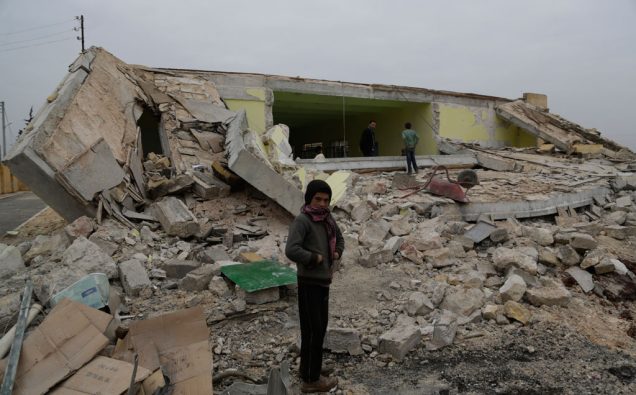
A child standing in front of his ground-flattened school after a bombardment in Ainjara village in rural Aleppo, Syria. Photo: UNICEF/Khalil Alshawi
EDITORIAL
Another year of Syrian conflict – more devastation and more loss of human lives – and another year of world failure. Major powers competing for influence, regional powers blinded by sectarian bias. Bashar al Assad survives and chaos thrives.
The deadly report card reads just a partial defeat of the Daesh – that in the first place was born of the Iraqi and Syrian conflicts. The defeat of the Dash will only be complete if the factors and conditions – grievances, poverty, injustice, denial of democratic rights to people and ungoverned spaces – it feeds on are addressed.
This week the United Nations lamented that after seven years of brutal conflict in Syria, there are no clear winners, “but the losers are plain to see.”
The UN refugee agency termed the conflict a “colossal human tragedy” that has cost hundreds of thousands of lives, driven 6.1 million people from their homes and forced 5.6 million others to seek safety in neighboring countries.
The statement amounts to admission of stark failure of the international system and the ineffectiveness of the United Nations itself – a reminder that the UN cannot enforce peace because the warring players are much more powerful than the world body.
The conflict resulted from Bashar al Assad’s refusal to meet the Syrian people’s demand for democracy as the Arab Spring inspired movements across the region in 2011. Since then, Assad has been committing war crimes and crimes against humanity including use of chemical weapons. The Syrian regime’s reign of terror constitutes one of the worst and darkest chapters of state terror in modern history.
The Barack Obama Administration let Assad get away with flouting of Washington-set red lines. Iran and Saudi Arabia ignored respect for human lives in their fight for regional supremacy. Russia came to Assad’s rescue. The Daesh exploited widespread disaffection to unleash its terror and a whole generation of Syrian children paid the price for collective international failures.
As for the survivors, the UN figures say 69 per cent of civilians inside the country are languishing in extreme poverty, with conditions being “worse than ever.
“Ninety per cent of families now spend more than half their annual income on food as prices are, on average, eight times higher than pre-crisis levels. Moreover, some 5.6 million people lack security or basic rights and require humanitarian assistance.”
In recent months, the world has once again turned a blind eye to the plight of “hundreds of thousands of people in dire need inside Eastern Ghouta and other besieged parts of the country.”
Only this week, humanitarian convoy delivering aid to besieged Eastern Ghouta was cut short amidst ongoing shelling and subsequent attempts to transport aid have been thwarted, according to the UN.
“Meanwhile, hopes of millions of Syrian refugees living in Turkey, Lebanon, Jordan, Egypt and Iraq who dream of returning home when conditions are safe are being dashed.”
“With fighting in parts of Syria as fierce as at any point during the conflict, refugees are understandably still too frightened to return,” UNHCR chief Grandi says.
It’s not just one country that has been destroyed. With Syria lost, the whole region and the world will have to pay the cost as chaos, poverty, crime and ungoverned spaces for years to come will perpetuate more death and destruction on the killing fields of Syria.
Already, Afghanistan, Iraq, Yemen and several African countries hold out horror signs with the emergence of new militant threats and the dictatorial regimes’ state-sponsored devastation of their own countries.
The world will have to do much – much more than we can even imagine – to stop that kind of bloodshed and chaos that might spread out from the man-made Middle Eastern sandstorms.














